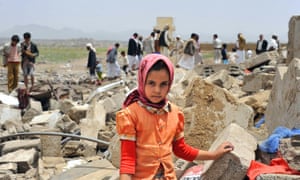One Friday in Old Sana’a, while filming the aftermath of the Saudi-led coalition bombings, I found myself surrounded by a group of militia who were trying to take hold of my camera. I was detained for a few hours in the ruins, confused and unnerved. The interrogation I received from the Houthis was relentless. But the problems didn’t stop here. For a week, I was harassed with regular phone calls and visits from National Security officials at my hotel. All this despite having a press visa issued in London.
Incidents such as these are increasingly common since the rebel Houthi militia took over Sana’a in late September last year. Local journalists have either fled to their villages or left the country. Some have been threatened and assaulted, while others’ homes have been ransacked, their families living in constant fear. There are only a handful of foreign journalists in the country and they keep a low profile.
One former Yemen Times radio journalist, Mohammed al-Qalisi, recalls the golden years of press freedom from 2011 to 2014. “I could say anything against the government. These are dark days for media now.” After the revolution in 2011 that led to the end of Ali Abdullah Saleh’s 33-year reign, there was a proliferation of websites, newspapers, television and radio stations. Now all that remains are two newspapers in the capital, forced to operate according to the militia’s guidelines. Al-Qalisi from Sana’a, a reporter for The National, is trapped in the south of the country and can’t return home for fear of reprisals. Unwilling to leave Yemen, he is keen to tell its story, but feels he can’t do so freely.
In a recent report the Yemeni journalists’ syndicate recorded at least 200 violations of press freedom since January: 10 journalists were killed and 14 imprisoned, of whom at least nine are said to have been tortured by the Houthis.
Yemen’s war is not only a forgotten war, for many it is also unknown. “They are butchering us every day, but nobody knows,” said Mohammed, who works in Sana’a. He pulled out his camera and showed me bloody photographs of young children and an elderly man killed in his hometown, Taiz. It hadn’t been in the news.
Once popularly known as the cultural capital, today Taiz is a theatre of human suffering. If people aren’t dying from the shelling, they are dying inside their homes – from disease and lack of food, water and medicine. Last week, the death of six-year-old Fareed Shawky, who had earlier pleaded from his hospital bed, “Don’t bury me,” became a symbol of the human cost of Yemen’s war.
After his visit to the country in August, Peter Maurer of the International Committee of the Red Cross said, “Yemen in five months is like Syria after five years.” With nearly 1.4 million people internally displaced and 6,000 killed, hospital shutdowns and 21 million in need of dire humanitarian assistance, international media presence is crucial. Yet, coverage of Yemen is only a fraction of what we see for Syria, Libya and Iraq.
With such a precarious and hostile atmosphere for journalists, this is going to be a difficult problem to address. Quite apart from the threat to journalists’ safety, with only two flights to Sana’a each week, controlled by Saudi Arabia, it is hard to enter and exit the country at all.
It is not only journalists who have been persecuted, but also activists. Abdulkader al-Juneid, a prominent doctor and activist, was kidnapped three months ago from his home for posting anti-Houthi tweets. His last tweet read, “Armed men are in my house.” Little has been heard about him since, while his family anxiously await his return. Two weeks ago, a group of journalists and activists who organised a march to deliver water to the besieged province of Taiz were detained and tortured in Ibb before the march could start. Six are still being held.
If the media can’t do their job by reporting facts on the ground, how can we expect a proper global response? Yemen’s human tragedy is exacerbated when the world can’t comprehend who is behind the abductions and killing of innocent civilians. There are passionate local journalists such as al-Qalisi, keen to communicate Yemen’s story. But they live in fear. When they are abducted, they are forgotten. This widespread fear has not only silenced the press, but also the people. Suppressing people’s voices goes against the very ideas from which Yemen’s revolution was born.
The world needs to know what is happening in Yemen, accurately. Right now, the conditions journalists face make that ideal very hard to achieve.
